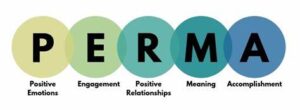The Power of Positive Emotions: How They Can Boost Your Well-Being and Happiness
Have you ever felt a surge of joy when you accomplished a goal, a wave of gratitude when you received a gift, or a burst of love when you hugged someone? If so, you have experienced positive emotions. Positive emotions are pleasant or desirable feelings that arise from positive situations, events, or interactions. They can make us feel good, energized, and motivated.
But positive emotions are more than just fleeting moments of happiness. They can also have profound effects on our well-being, happiness, resilience, and health. In this article, we will explore what positive emotions are, how they differ from negative emotions, and why they are important for our well-being and happiness. We will also discuss some of the benefits of positive emotions, such as how they can help us to see the world in a more positive light, be more creative and open to new experiences, connect with others and build strong relationships, cope with stress and adversity, and improve our physical and mental health.
What are Positive Emotions and How Do They Differ from Negative Emotions?
Positive emotions are feelings that we typically enjoy having and want to cultivate. They include emotions such as joy, gratitude, love, serenity, interest, hope, pride, amusement, inspiration, awe, and more. According to psychologist Barbara Fredrickson, who is a leading researcher on positive emotions, positive emotions have three main characteristics:
-
- They broaden our awareness and attention. When we experience positive emotions, we tend to see more possibilities and opportunities in our environment. We also become more curious and open to new ideas and experiences.
-
- They build our psychological resources. When we experience positive emotions, we tend to develop more skills, knowledge, abilities, relationships, and values that can enhance our well-being and happiness in the long run.
-
- They transform us for the better. When we experience positive emotions regularly over time, they can create lasting changes in our brain structure and function that can improve our emotional resilience and well-being.
Negative emotions are feelings that we typically do not enjoy having and want to avoid. They include emotions such as anger, fear, sadness, guilt, shame, disgust, and more. According to psychologist Paul Ekman, who is a leading researcher on negative emotions, negative emotions have three main characteristics:
-
- They narrow our focus and attention. When we experience negative emotions, we tend to focus on the specific threat or problem that triggered them. We also become more vigilant and alert to potential dangers and risks.
-
- They mobilize our physiological resources. When we experience negative emotions, we tend to activate our fight-or-flight response, which prepares our body for action. We also experience changes in our heart rate, blood pressure, breathing, and muscle tension.
-
- They help us to survive and adapt. When we experience negative emotions, we tend to learn from our mistakes and avoid repeating them. We also develop coping strategies and skills that can help us to deal with similar situations in the future.
Both positive and negative emotions are essential for our well-being and survival. They provide us with valuable information about our environment and ourselves, and they motivate us to take action. However, they differ in their effects on our well-being and happiness. While negative emotions can help us to overcome challenges and threats, they can also cause us to feel stressed, anxious, depressed, and unhappy if they are too frequent, intense, or prolonged. On the other hand, positive emotions can help us to enhance our well-being and happiness by expanding our perspective, enriching our lives, and transforming us for the better.
Benefits of Positive Emotions
Positive emotions have many benefits for our well-being, happiness, resilience, and health. Here are some of the benefits that research has shown:
-
- Positive emotions increase life satisfaction and subjective well-being. Subjective well-being is how we evaluate our own happiness and satisfaction with life. Research has shown that people who experience more positive emotions tend to report higher levels of subjective well-being than those who experience less positive emotions. For example, a study by Ed Diener et al. (1999) found that people who reported experiencing more joy, love, and interest in their daily lives also reported higher levels of life satisfaction and happiness than those who reported experiencing less of these emotions.
-
- Positive emotions buffer against depression and anxiety. Depression and anxiety are common mental health problems that affect millions of people worldwide. They are characterized by persistent feelings of sadness, hopelessness, worry, and fear. Research has shown that positive emotions can help to prevent or reduce the symptoms of depression and anxiety by counteracting the negative effects of stress and enhancing our coping abilities. For example, a study by Tugade and Fredrickson (2004) found that people who experienced more positive emotions during a stressful task were able to recover faster and more effectively from the negative effects of stress than those who experienced less positive emotions.
-
- Positive emotions enhance optimism and hope. Optimism and hope are positive expectations about the future that can motivate us to pursue our goals and overcome challenges. Research has shown that positive emotions can increase our levels of optimism and hope by broadening our outlook and increasing our confidence and self-efficacy. For example, a study by Cohn et al. (2009) found that people who experienced more positive emotions over a month also reported higher levels of optimism and hope than those who experienced less positive emotions.
-
- Positive emotions boost the immune system and cardiovascular health. The immune system is our body’s defense system against infections and diseases. The cardiovascular system is our body’s circulatory system that transports blood, oxygen, and nutrients throughout our body. Research has shown that positive emotions can improve our immune system and cardiovascular health by reducing inflammation and lowering blood pressure. For example, a study by Steptoe et al. (2005) found that people who reported experiencing more positive emotions over a day also had lower levels of inflammation and blood pressure than those who reported experiencing less positive emotions.
Broaden-and-Build Theory of Positive Emotions
One of the most influential theories that explains how positive emotions benefit our well-being and happiness is the broaden-and-build theory of positive emotions, proposed by Barbara Fredrickson. According to this theory, positive emotions have two main functions: they broaden our awareness and attention, and they build our psychological resources.
The broadening function of positive emotions refers to how they expand our cognitive and behavioral repertoire. When we experience positive emotions, we tend to see more possibilities and opportunities in our environment. We also become more curious and open to new ideas and experiences. This broadening effect can help us to discover new sources of joy, meaning, and purpose in life.
The building function of positive emotions refers to how they enhance our psychological capital. When we experience positive emotions, we tend to develop more skills, knowledge, abilities, relationships, and values that can enhance our well-being and happiness in the long run. These psychological resources can also help us to cope with stress and adversity, and to bounce back from negative emotions.
The broaden-and-build theory of positive emotions suggests that positive emotions can create a positive spiral of well-being and happiness. By broadening our awareness and attention, positive emotions can help us to experience more positive emotions in the future. By building our psychological resources, positive emotions can help us to sustain our well-being and happiness over time.
How Positive Emotions Can Help Us
Positive emotions can help us to achieve various outcomes that can improve our well-being and happiness. Here are some of the ways that positive emotions can help us to:
-
- See the world in a more positive light. Positive emotions can influence how we perceive and interpret our environment and ourselves. When we experience positive emotions, we tend to see the world in a more favorable and optimistic way. We also tend to have a more positive self-image and self-esteem. This positive outlook can help us to appreciate what we have, focus on our strengths, and overcome our challenges.
-
- Be more creative and open to new experiences. Positive emotions can stimulate our creativity and curiosity. When we experience positive emotions, we tend to generate more ideas and solutions, and to explore more possibilities and opportunities. We also tend to be more willing to try new things and learn new skills. This creative and open mindset can help us to discover new sources of joy, meaning, and purpose in life.
-
- Connect with others and build strong relationships. Positive emotions can foster our social connections and bonds. When we experience positive emotions, we tend to be more friendly, cooperative, and supportive towards others. We also tend to express more interest, empathy, and compassion towards others. These social behaviors can help us to form and maintain strong relationships that can provide us with love, support, and belonging.
-
- Cope with stress and adversity. Positive emotions can buffer us from the negative effects of stress and adversity. When we experience positive emotions, we tend to be more resilient and flexible in the face of challenges and difficulties. We also tend to use more adaptive coping strategies, such as problem-solving, seeking social support, and finding meaning. These coping skills can help us to overcome stress and adversity, and to grow from them.
-
- Improve our physical and mental health. Positive emotions can enhance our physical and mental health by reducing inflammation and lowering blood pressure, as we mentioned earlier. They can also improve our immune system and cardiovascular health by increasing our levels of antibodies and reducing our levels of cortisol, a stress hormone. Moreover, positive emotions can improve our mental health by preventing or reducing the symptoms of depression and anxiety, as we mentioned earlier. They can also increase our levels of neurotransmitters, such as serotonin and dopamine, that are associated with mood regulation and reward.
Conclusion
Positive emotions are more than just fleeting moments of happiness. They are powerful forces that can boost our well-being and happiness in many ways. By experiencing positive emotions regularly, we can broaden our awareness and attention, build our psychological resources, and transform ourselves for the better. We can also see the world in a more positive light, be more creative and open to new experiences, connect with others and build strong relationships, cope with stress and adversity, and improve our physical and mental health.
So how can we experience more positive emotions in our daily lives? There are many ways to cultivate positive emotions, such as:
-
- Practicing gratitude. Gratitude is the appreciation of what we have and what others do for us. By expressing gratitude regularly, we can increase our levels of joy, love, and satisfaction.
-
- Savoring positive experiences. Savoring is the act of paying attention to and enjoying the positive aspects of our lives. By savoring positive experiences more often, we can prolong and intensify our feelings of pleasure, interest, and awe.
-
- Engaging in meaningful activities. Meaningful activities are those that align with our values and goals, and that contribute to something larger than ourselves. By engaging in meaningful activities more frequently, we can enhance our feelings of purpose, fulfillment, and inspiration.
-
- Practicing kindness. Kindness is the act of being friendly, generous, and considerate towards others. By practicing kindness more often, we can increase our levels of love, gratitude, and happiness.
-
- Seeking positive relationships. Positive relationships are those that are supportive, respectful, and caring. By seeking positive relationships more often, we can increase our levels of love, trust, and belonging.
Positive emotions are not only good for us, but also good for others. When we experience positive emotions, we tend to spread them to others through our words and actions. We also tend to inspire others to experience positive emotions themselves. This can create a ripple effect of positivity that can benefit our families, friends, communities, and society.
Great Things Never Came From Comfort Zones
Say goodbye to that rut you’ve been stuck in and hello to a brighter future with enLiven Wellness Life Coaching team. Get started today by scheduling a consultation with our team.
Related Resources
enLiven Wellness Coaching, llc is a participant in the Amazon Services LLC Associates Program, an affiliate advertising program designed to provide a means for website owners to earn advertising fees by advertising and linking to amazon.com, audible.com, and any other website that may be affiliated with Amazon Service LLC Associates Program. As an Amazon Associate [I or we] earn from qualifying purchases.
Additional Articles in this Series
This article is part of a series of articles on the five pillars of well-being. The pillars are positive emotion, engagement, relationship, meaning, and accomplishment.

















